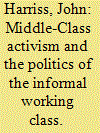|
|
|
Sort Order |
|
|
|
Items / Page
|
|
|
|
|
|
|
| Srl | Item |
| 1 |
ID:
076068


|
|
|
|
|
| Publication |
2006.
|
| Summary/Abstract |
The rigidity of early class analysis and the recent demise of any type of class analytics have turned attention away from examining the growing population of informally employed workers as a class. By not examining informal workers as a class "in themselves," we are losing insights into how they are translating their positions into a class "for themselves." As a consequence, the recent literature on globalization and liberalization is increasingly concluding that the decreasing proportion of formally employed workers (and the subsequent rise in informal employment) the world over signifies a decline in all class-based organization. Such arguments have obscured our understanding of the current social dynamics of exploitation and resistance. In an attempt to begin filling this gap, this article recovers class as an important analytical tool with which to examine (1) the current relations of power between the state, employers, and the majority of India's workers, and (2) how the structures of production within which informal workers operate affect their collective action strategies. A reformulated labor movement model is offered to expose the underlying mechanisms through which informal workers translate their location in the class structure as a class "in itself" into a political group as a class "for itself." Insights into how informal workers organize can have profound implications for our understanding of changing state-labor relations as national governments attempt to liberalize their economies and simultaneously rein in their welfare functions.
|
|
|
|
|
|
|
|
|
|
|
|
|
|
|
|
| 2 |
ID:
076070


|
|
|
| 3 |
ID:
076069


|
|
|
|
|
| Publication |
2006.
|
| Summary/Abstract |
This article, drawing on the results of both survey research and of ethnography in Delhi, Bangalore, and Chennai, concerns the relationships between the middle class and the informal working class in Indian cities in the sphere of civil society. These relationships are shown to be very significant in the definition of the "middle class" and a critical dimension of the reproduction of class relationships. They also demonstrate that civil society should not be abstracted from the field of class relations, in the way that characterizes some contemporary arguments about the potentials of civil organization. Civil society is shown to be distinctly stratified. On the whole it is a sphere of middle class activism, and such activism is one of the defining features of the middle class. Members of the informal working class, on the other hand, are largely excluded from active participation in civil society organizations, so that increasing opportunities for political participation through civil organization may be associated with increased political inequality. The exceptions to this general rule are sometimes interlinked movements for women's rights, for the rights of informal workers, and for rights to housing-in which women from the informal working class are notably active. The issues of housing and of rights to livelihood, however, frequently bring the middle class and the informal working class into contention. Politics is often the only resource available to informal workers and their valuation of electoral democracy is to be understood in this context
|
|
|
|
|
|
|
|
|
|
|
|
|
|
|
|
| 4 |
ID:
076066


|
|
|
|
|
| Publication |
2006.
|
| Summary/Abstract |
The decline of class analysis has been pervasive across the intellectual landscape in recent years. But South Asian studies stands out in the severity with which it has been hit by this phenomenon. It also is the field where the influence of post-structuralism has been most pronounced in the wake of Marxism's decline. This essay offers an explanation for both the decline of class analysis and the ascendance of post-structuralism in South Asian studies as practiced in the United States. I suggest that the decline of class theorizing was a predictable and natural result of the decline of working-class politics in the United States. But the severity of its decline in South Asian studies in particular was a symptom of its never having made much of a dent on the field in the first place. This left unchallenged the traditional, Indological approach, which was heavily oriented toward culturalism. This in turn made the field a hospitable ground for the entrance of post-structuralism, which, like mainstream Indology, not only eschews materialist analysis, but is largely hostile to class. South Asian studies is thus one of the few fields in which traditional scholars and younger ones are both able to agree on their hostility to class analysis. Finally, I argue that the decline of class is now visible in Indian universities too, and this is largely caused by the overwhelming influence that U.S. universities have come to exercise over Indian elite academic culture.
|
|
|
|
|
|
|
|
|
|
|
|
|
|
|
|
| 5 |
ID:
076065


|
|
|
|
|
| Publication |
2006.
|
| Summary/Abstract |
Class explains much in the differentiation of life chances and political dynamics in South Asia. Yet in the subcontinent class has lost its centrality as a way of understanding the world and how it changes. Indian intellectuals have been a major force in the eclipsing of class through discursive strategies of constructivist idealism. Formalism in social sciences finds class relations elusive and difficult to measure. Market triumphalism eclipsed concern with rehabilitation of "weaker sectors" and redressing of exploitation as measures of national success. Class analytics, however, continues to serve two critical functions: disaggregating development and explaining challenges to rules of the game. Restoring agency to class requires attention first to relations that structure choice in restricted or expansive ways. Global forces have altered people's relations to production and to one another, as have changes in the political opportunity structure, with significant effects on tactics and outcomes. Knowing how to aggregate or disaggregate classes is more complicated than ever. Nevertheless, alternative understandings of class structure are more than academic: they reflect the strategies of political actors. The difficulty for class analysis is to illuminate the conditions under which interests of those disabled by particular class systems may be inter-subjectively recognized and acted upon politically at the local and/or international levels. Appropriate and robust sociopolitical theory for this purpose is illusive, but no more so for class than for other bases of difference - caste, community, identity, gender-that likewise seek to explain transformation of locations in social structures to effective collective agency
|
|
|
|
|
|
|
|
|
|
|
|
|
|
|
|
| 6 |
ID:
076067


|
|
|
|
|
| Publication |
2006.
|
| Summary/Abstract |
Despite its central importance to India's political and economic development, the organizational capacity of India's working class is poorly understood. Standard social scientific accounts portray the Indian working class as weakened by continual fragmentation and wholly dominated by political parties and the state. Social scientists therefore assume that the Indian working class is economically and politically inconsequential. This essay challenges these prominent misconceptions. Drawing on original survey data, government statistics, and a discussion of Indian industrial and labor law, the author shows that the Indian labor movement has been much more unified, much more contentious in the collective bargaining arena, and much more politically influential than previously assumed. The author speculates that the key reason social scientists have misjudged the strength of organized labor in India is that their assessments have relied too heavily on "key source" interviews with business, political and trade union elites, all of whom have incentives to portray workers as divided and weak.
|
|
|
|
|
|
|
|
|
|
|
|
|
|
|
|
|
|
|
|
|